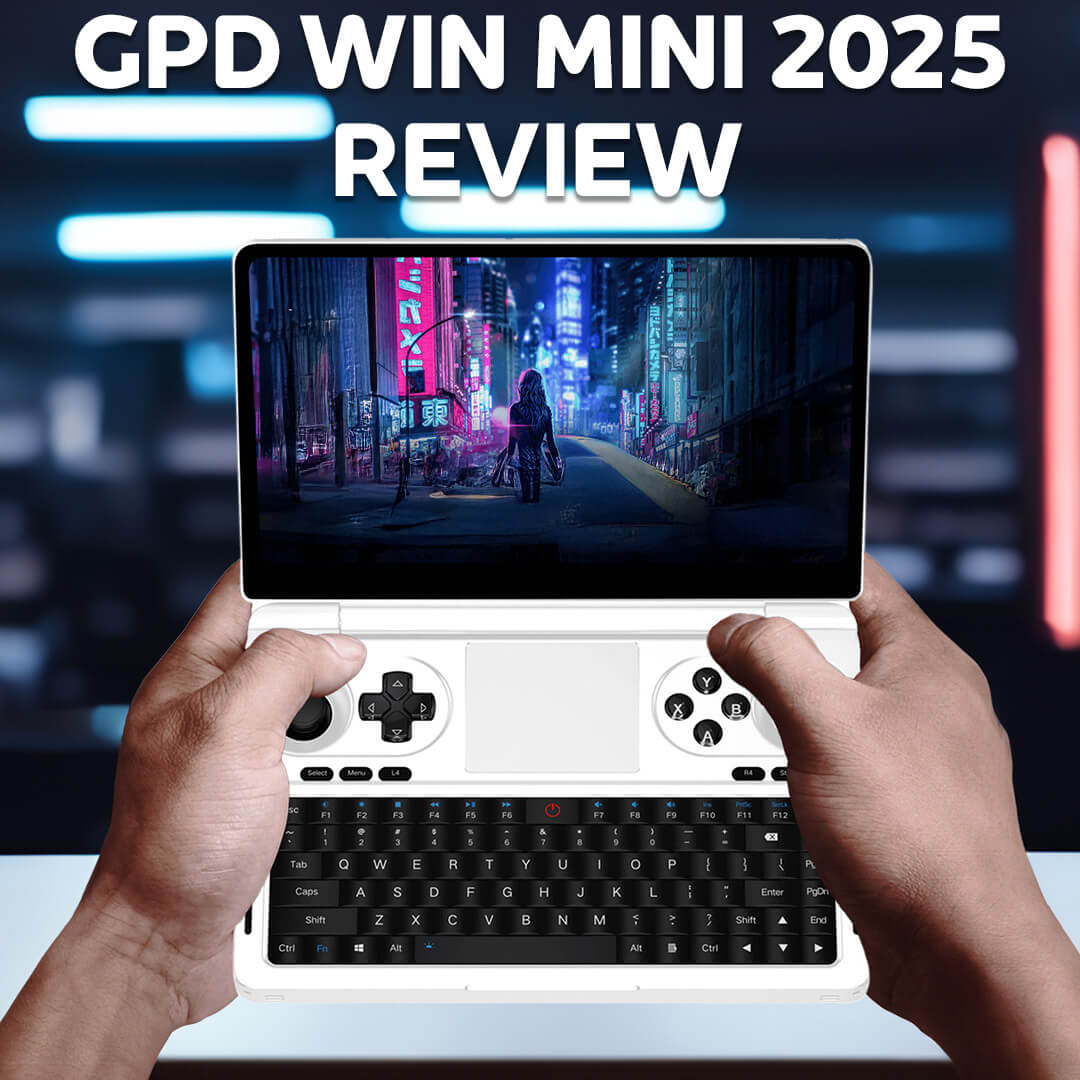
GPD WIN MINI 2025 Review – Compact Console-Like Fun with a 120Hz Twist
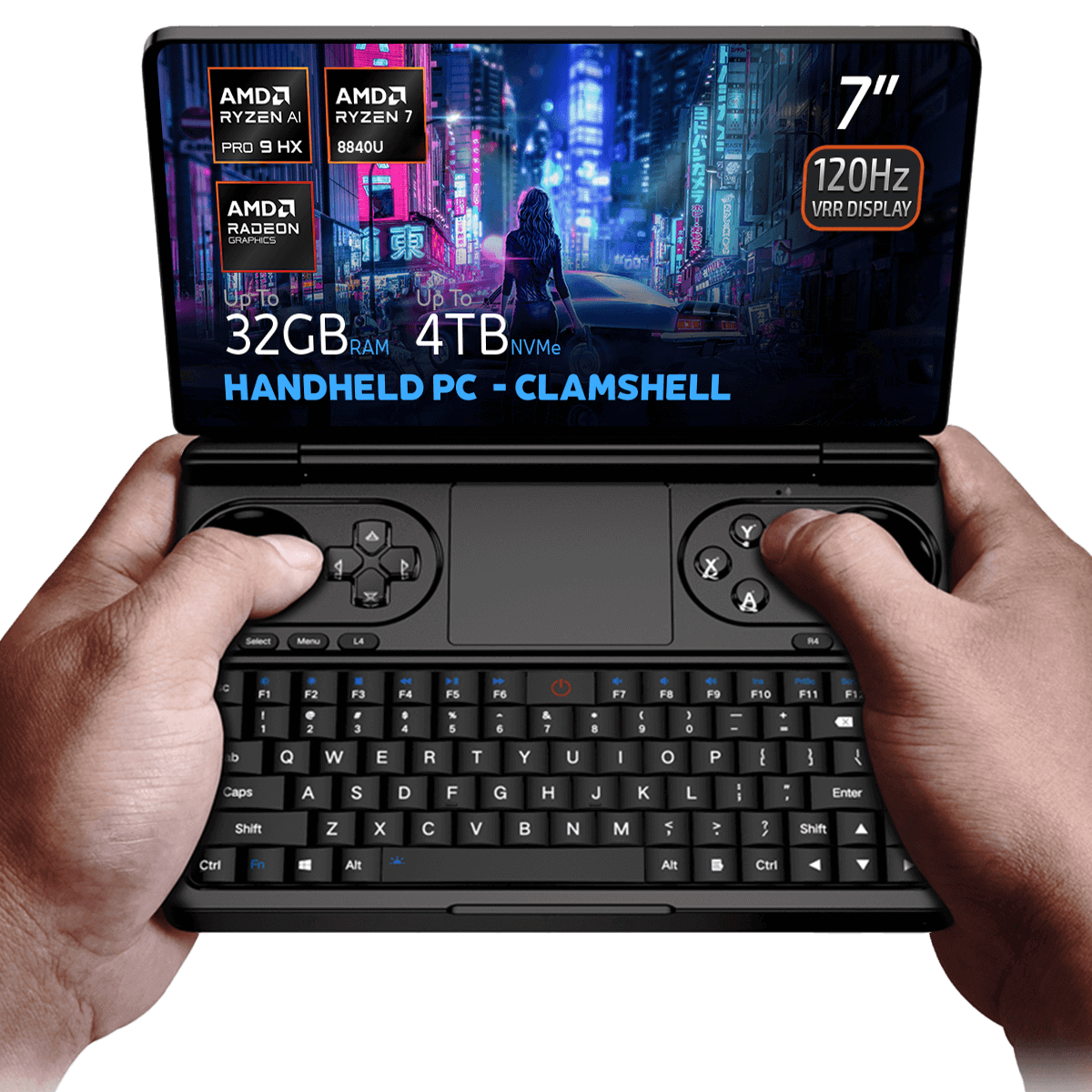
GPD WIN Mini 2025
In the last stretch of the GPD 2025 model updates, we turn our focus to the fresh GPD WIN Mini 2025, powered by the AMD Ryzen AI 9 HX 370 processor. In our GPD WIN MINI 2025 review, we will line it up against other HX 370-based products to see exactly how this handheld gaming computer measures up.
GPD WIN MINI 2025 Review Video
GPD WIN MINI 2025 Overview
We begin our GPD WIN MINI 2025 review by giving the portable gaming PC itself a closer inspection. The GPD WIN Mini 2025 measures 6.7 x 4.2 x 1 inches (17.2 x 10.9 x 2.7 cm) and weighs 555g (1.2 lbs). The 2025 model is marginally bigger than the 2023 and 2024 releases—about 4 mm wider and 1 mm thicker.
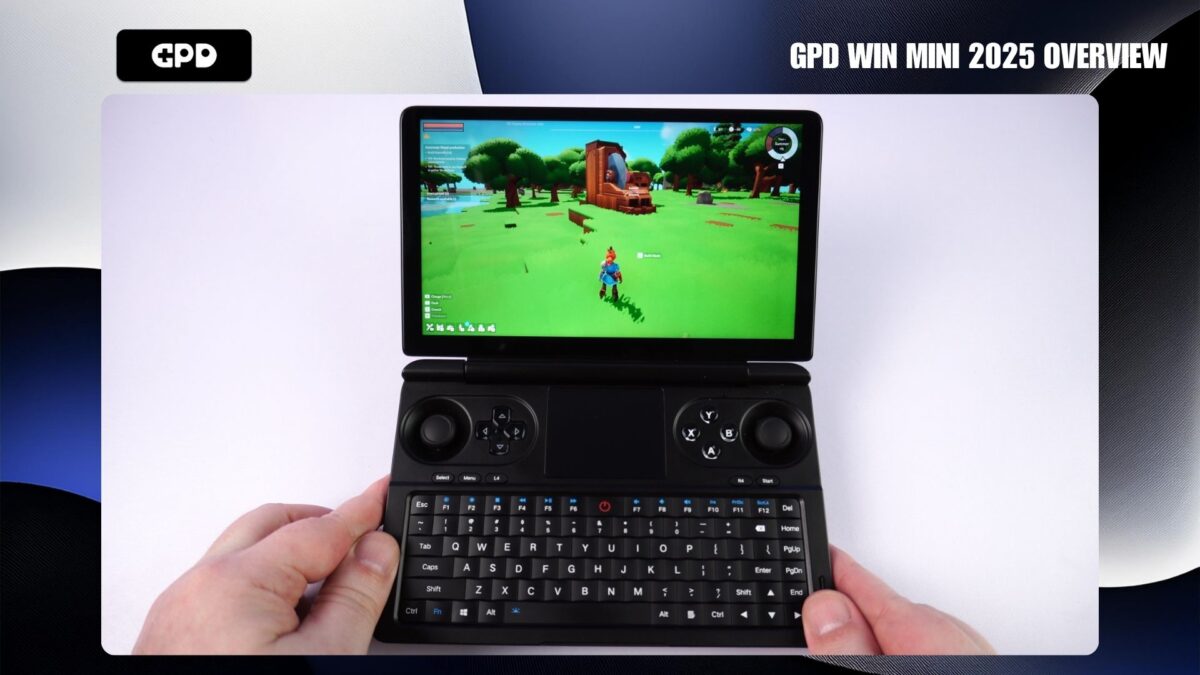
Opening the lid reveals a vivid 7” LTPS touchscreen that can handle up to 1080P resolution with 60Hz or 120Hz refresh rates, plus Variable Refresh Rate and AMD FreeSync support.
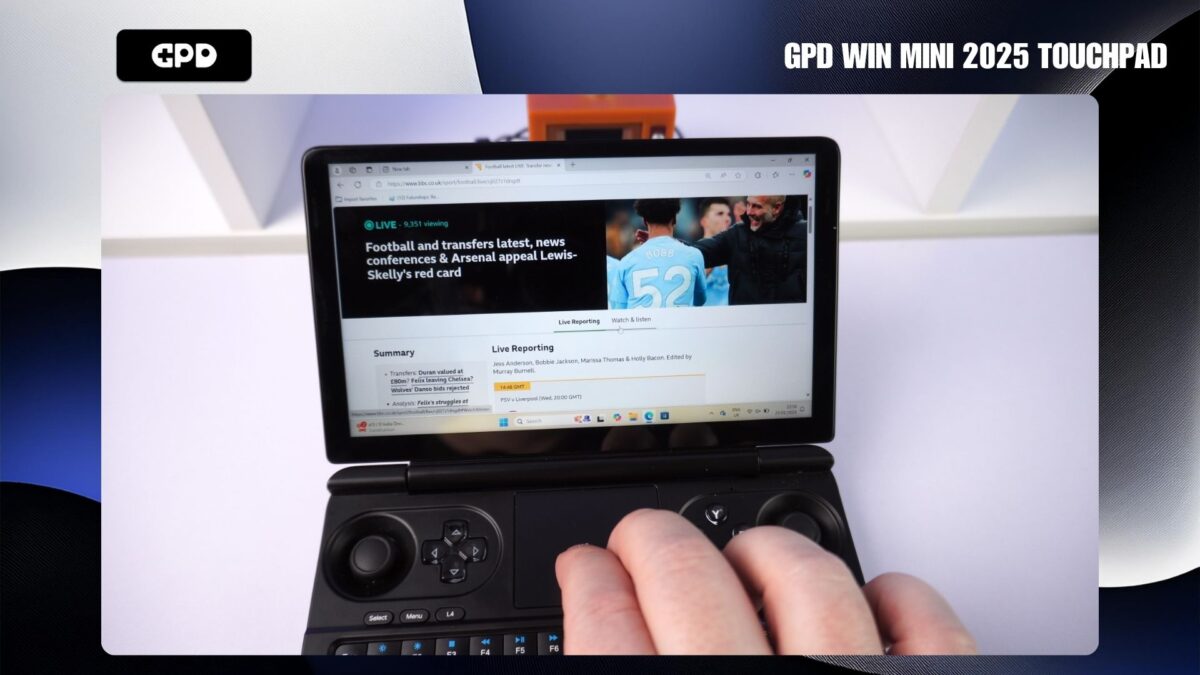
Moving down, there are two analog sticks, a D-Pad, and your usual gaming buttons. A central touchpad sits between them, though it isn’t clickable, so finger gestures are all you have, or you can swap to mouse mode and use the shoulder buttons as left and right clicks.
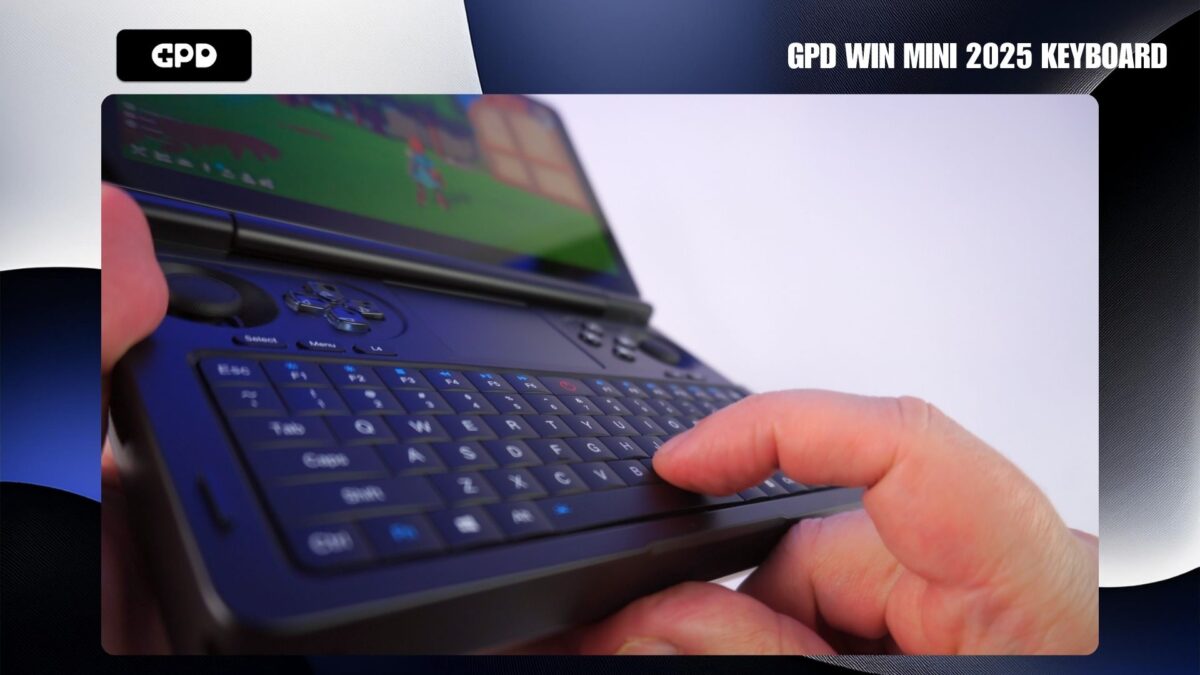
Below that is a compact gaming PC keyboard with two levels of adjustable backlighting, which can also be turned completely off. The keys are tiny, making them less than ideal for typing long messages compared to a GPD WIN MAX 2 system or a standard laptop. They’re best for shorter replies, browsing, or quick in-game chat.
On the left side of the GPD WIN Mini 2025 is a switch that toggles the controls between mouse and gamepad modes.
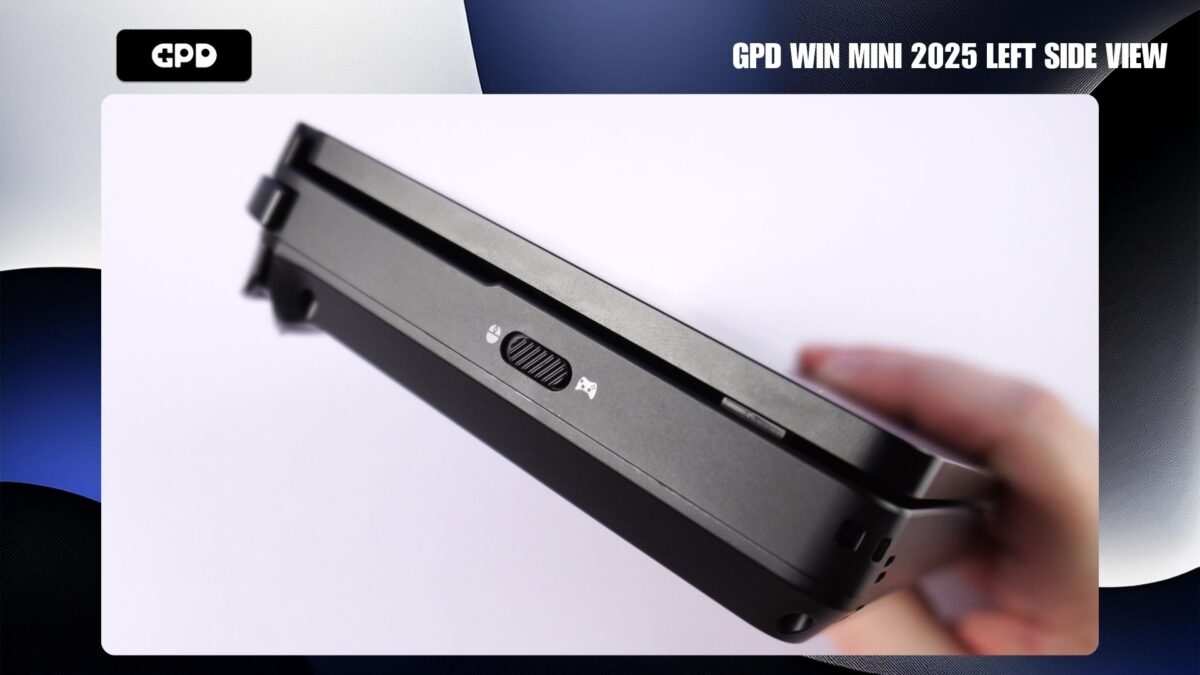
At the rear, each side features shoulder and trigger inputs. In between, there’s a USB 4 Type-C port for high-speed devices such as an eGPU. Next, you find a standard Type-C port for charging, followed by a 3.5mm audio jack, a micro SD card slot, and a USB-A port.
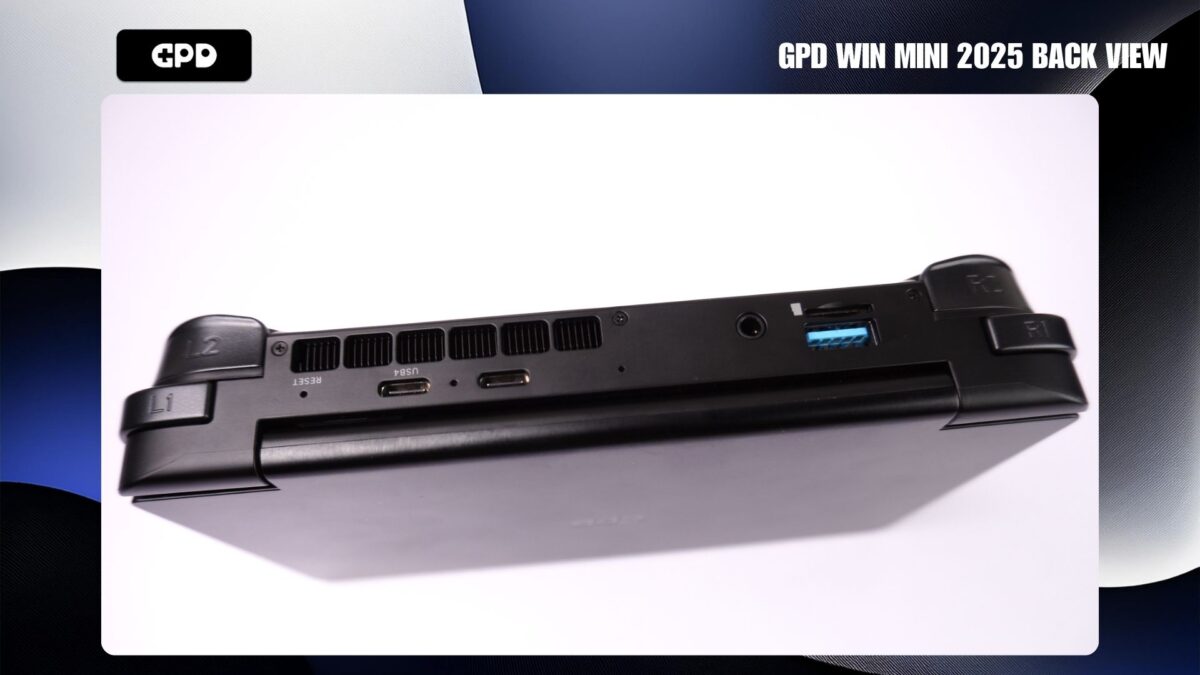
GPD WIN MINI 2025 Technical Specifications
Continuing our GPD WIN MINI 2025 review, we examine present and past mobile gaming PC specs and carry out our own battery, fan noise, and thermal checks.
GPD WIN MINI Series CPU & GPU Comparison
| GPD WIN MINI 2023 | GPD WIN MINI 2024/2025 | GPD WIN MINI 2025 | |
| CPU | AMD Ryzen 7 7840U, 8 cores, 16 threads up to 5.1 GHz | AMD Ryzen 7 8840U, 8 cores, 16 threads up to 5.1GHz | AMD Ryzen AI 9 HX 370, 12 cores, 14 threads up to 5.1GHz |
| GPU | AMD Radeon 780M up to 2,700Mhz | AMD Radeon 780M up to 2,700Mhz | AMD Radeon 890M up to 2,900MHz |
| BUY | HERE | HERE | HERE |
GPD WIN MINI 2025 Tech Specs
| DISPLAY | 7 inches, up to 1920×1080 resolution, LTPS, 120Hz, 16:9, 299 PPI (RGB) |
| RAM | 32GB or 64GB LPDDR5X |
| STORAGE | 1TB, 2TB, 4TB NVMe PCIE 4.0 2280 |
| WI-FI | 6E |
| BLUETOOTH | 5.3 |
| I/O | 1x USB 4.0 Type-C 1x USB Type-C 3.2 Gen2 1x USB Type-A 3.2 Gen2 1x Micro SD Card Slot |
| BATTERY | 44.24Wh rechargeable battery |
In our battery test, looping Cinebench at full brightness at 28W TDP, we recorded a usage span of 1 hour and 8 minutes. That’s about 8 minutes longer than what we observed with the GPD Win 4, and around 12 minutes shorter than the GPD WIN MAX 2 2025 portable gaming computer. You can typically expect between 3 to 6 hours of power depending on your usage.
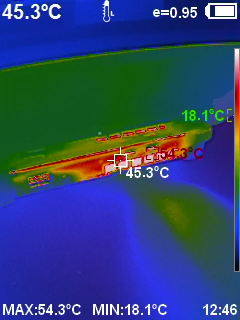
For highest fan noise and temperature tests—again running Cinebench—max noise reached 64dB, while temperatures topped out at 55°C.
System Benchmarks
Next in our GPD WIN MINI 2025 review is comparing it against other HX-based compact gaming PC devices to measure its overall performance.
PCMARK
PCMARK runs an array of tasks that stress the CPU, GPU, RAM, and storage. Scores are fairly close overall, with the Win Mini taking third place, just slightly behind the GPD Win 4 2025 and MAX 2 2025 models.
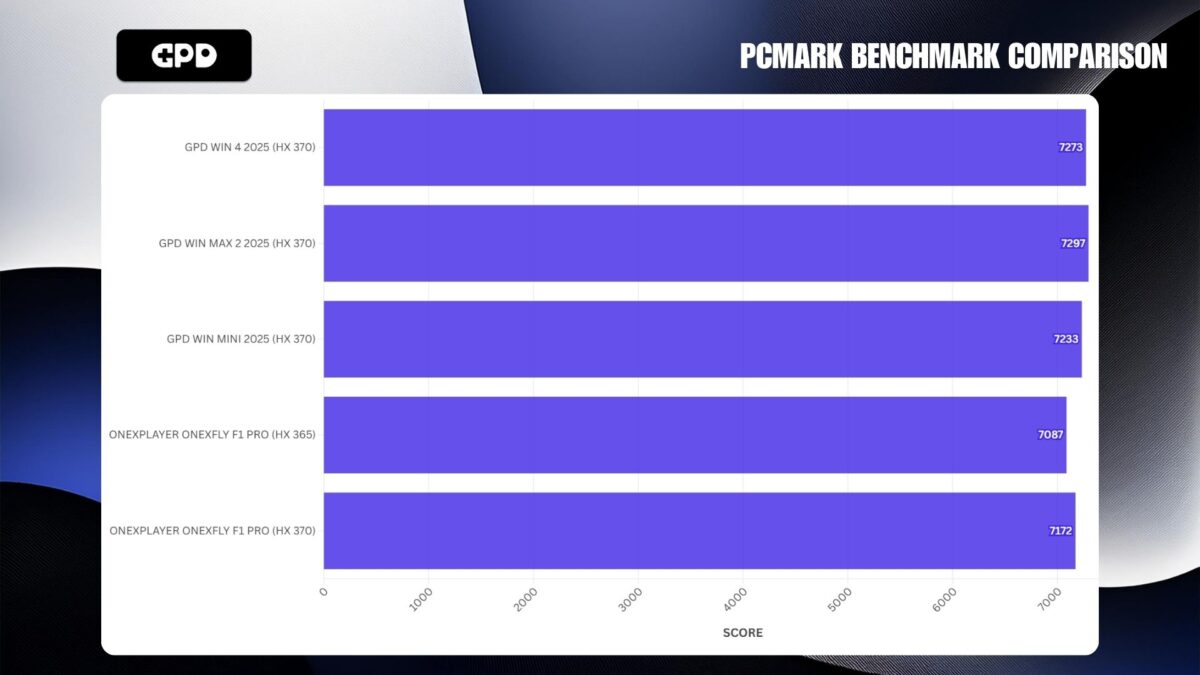
Cinebench 2024
Cinebench evaluates single- and multi-core CPU speed. We see typical results for single-core performance and somewhat lower figures for multi-core, matching those of the ONEXPLAYER ONEXGPU F1 Pro HX 365 model.
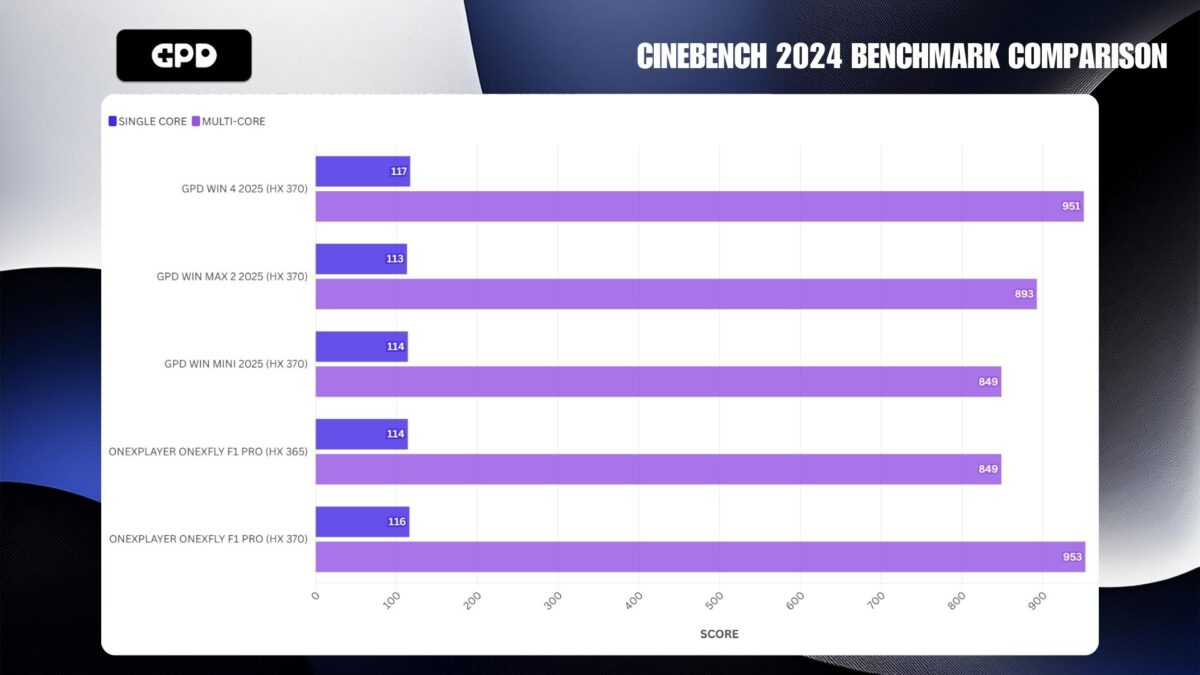
Geekbench 6
Geekbench 6 similarly tests single- and multi-core CPU performance, showing near-identical single-core results. In multi-core, the GPD WIN Mini 2025 lands in second place, just behind the ONEXFLY F1 Pro.
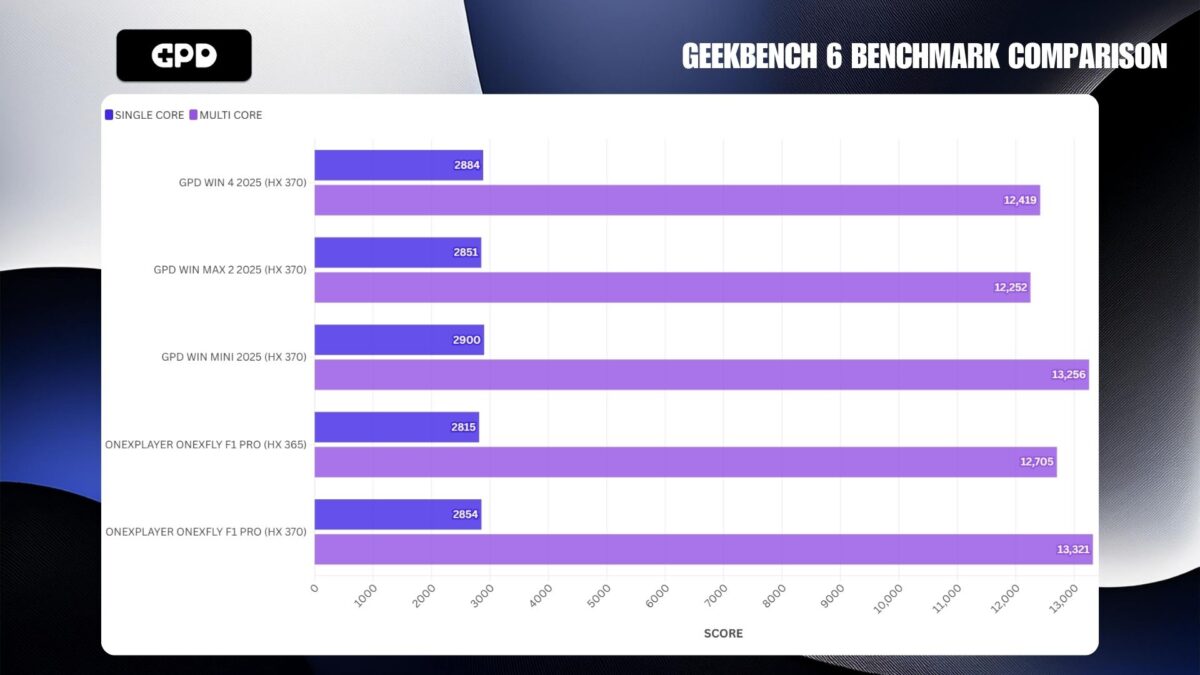
3DMARK
Using 3DMARK’s Time Spy, Night Raid, and Fire Strike tests, the scores come in at 3,879, 28,959, and 7,793, respectively. These results vary from second place, to near the lower end, to third, but overall provide solid numbers.
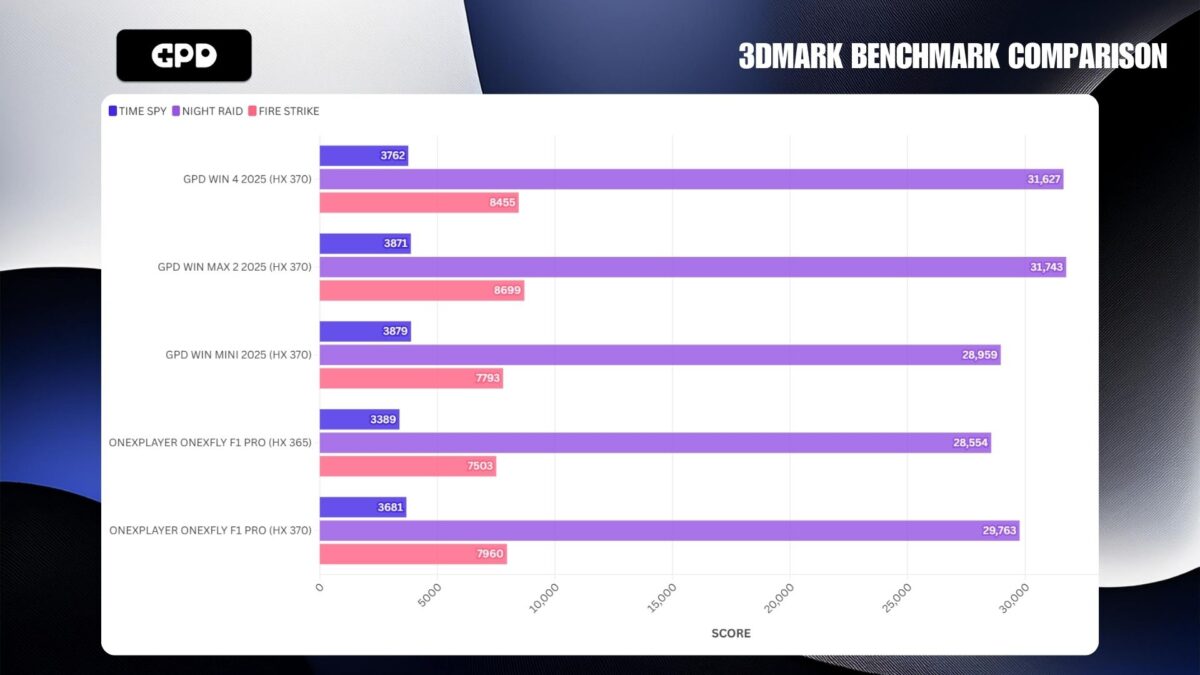
Gaming Benchmarks
We test a variety of titles at 1080P and 720P across different TDPs as part of our GPD WIN Mini 2025 review, comparing performance with other HX-based units.
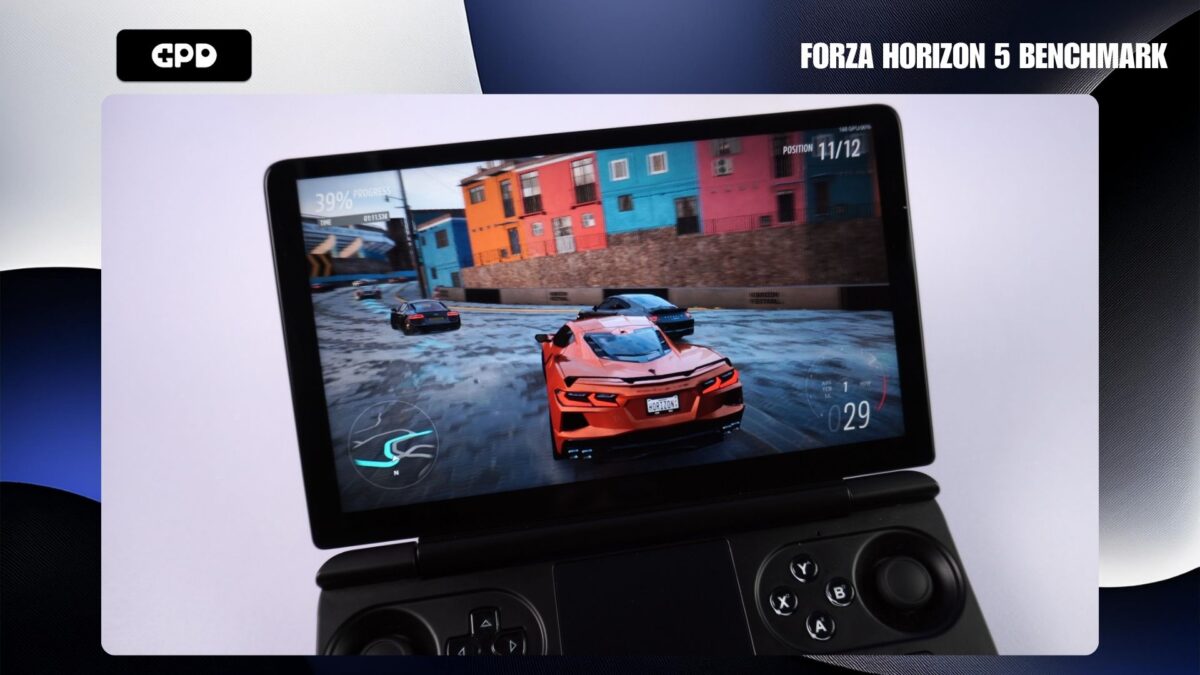
Forza Horizon 5
At 1080P, its frame rates closely match the other GPD devices—good news for performance. At 720P, it surpasses rival systems at higher TDP settings but falls behind once the TDP is lowered.
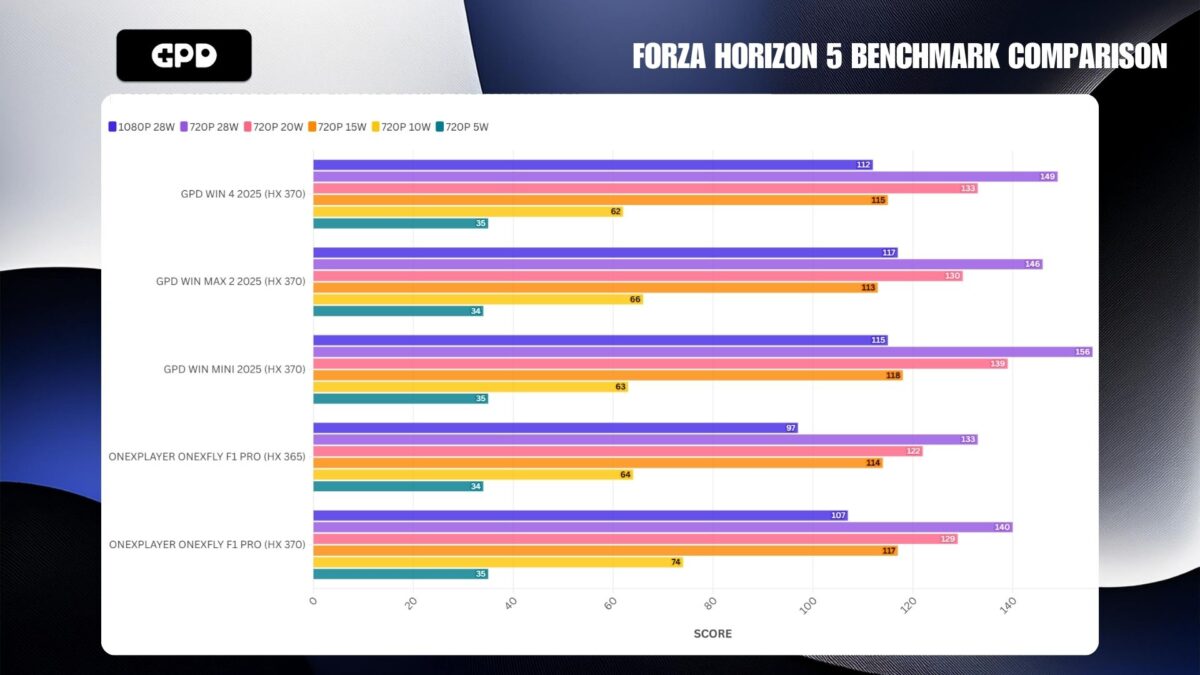
Shadow of the Tomb Raider
Shadow of the Tomb Raider sees a shared first place at 1080P. Across the 720P TDP range, it stays at the top until it drops to 10W TDP. All in all, impressive results.
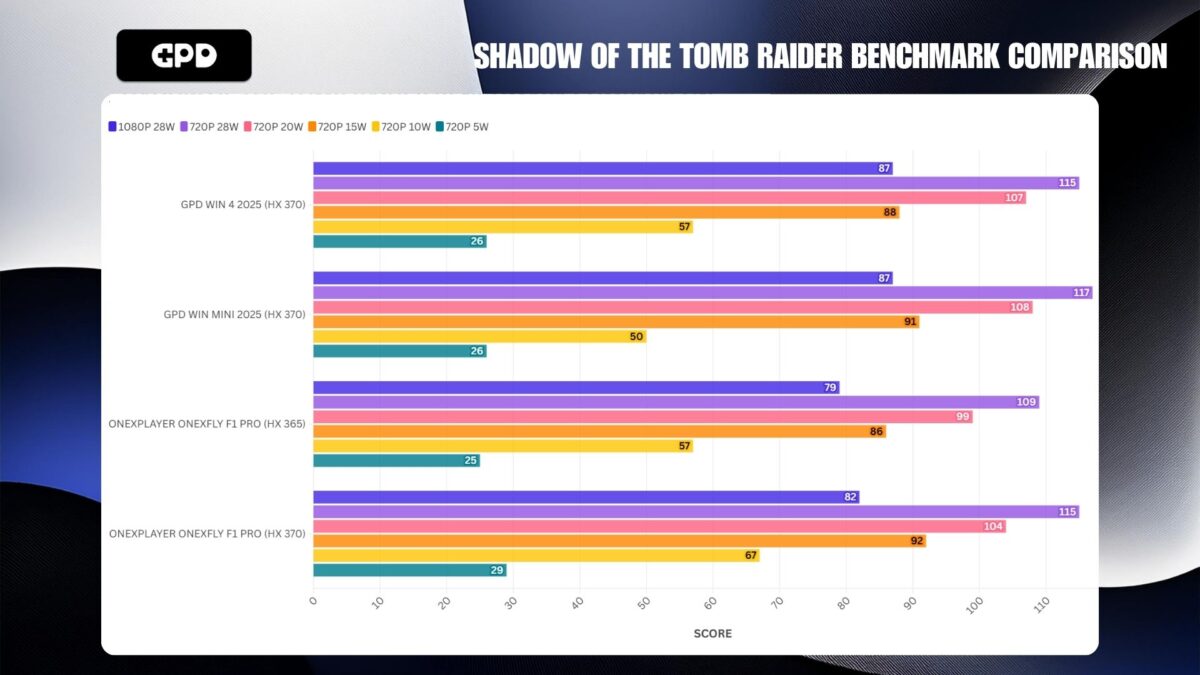
Cyberpunk
Cyberpunk at 1080P basically ties for first place with the other two GPD handheld gaming computer devices. At 720P, it leads the pack up until 10W TDP, where it evens out with competitors. Again, these are notable outcomes.
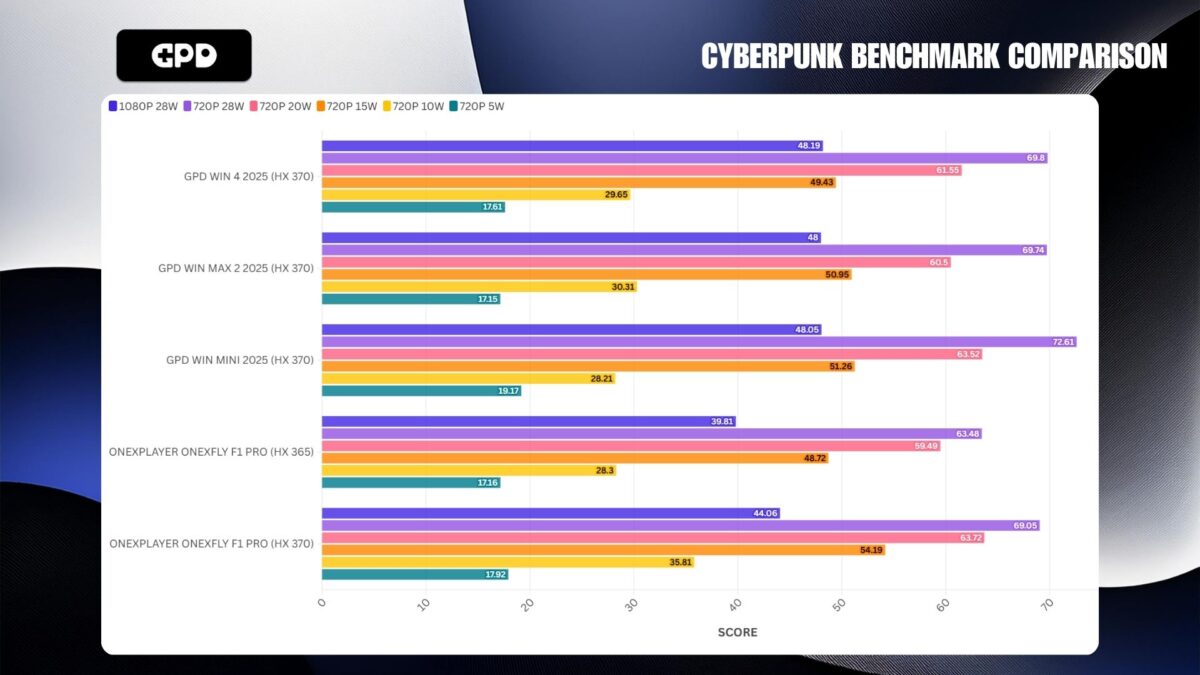
Benchmark Summary
Overall, the GPD WIN Mini 2025 shows a strong performance profile. It frequently ranks in first or near the top in many of the tests. Interestingly, it’s especially dominant at 28W TDP but loses some momentum around the 10W mark compared to other systems.
Gaming Performance
Continuing our GPD WIN Mini 2025 review, let’s look at how games run in real-world scenarios and some good settings to try on these mobile gaming PC devices.
Palworld
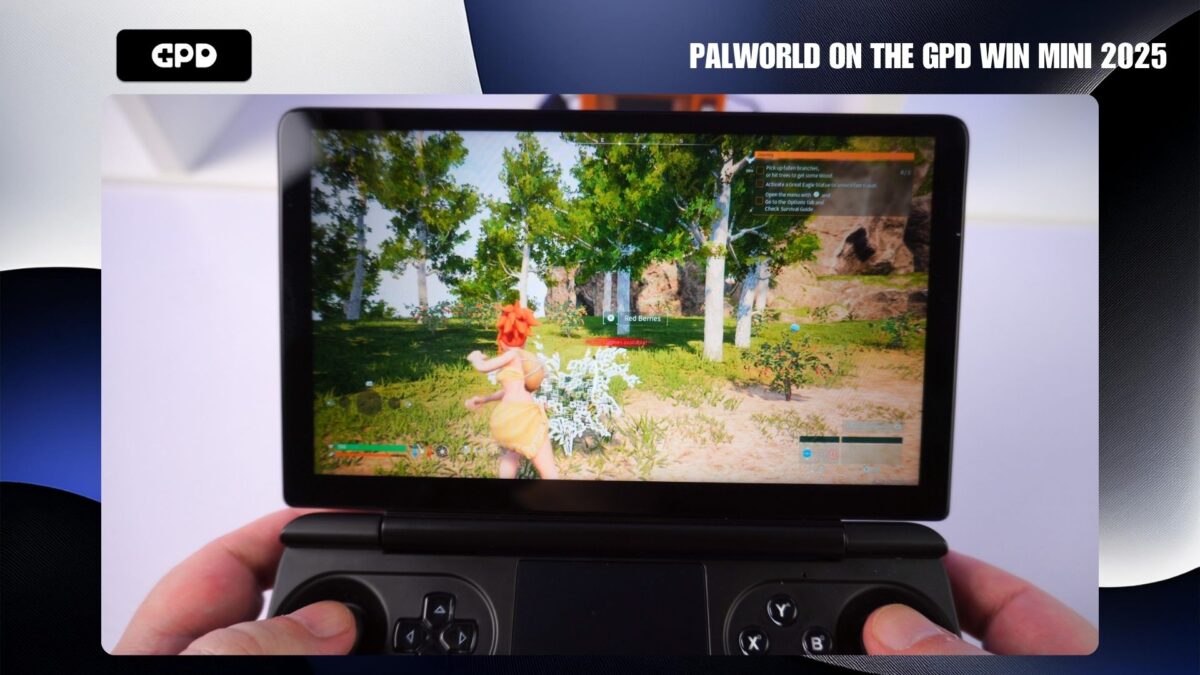
Palworld plays smoothly at 1080P on low settings with 60+ FPS at 28W TDP, or you could reduce the resolution to 720P and push higher graphical settings.
No Man’s Sky
For No Man’s Sky, 720P High settings yield a solid 60 FPS, or you can opt for 1080P Standard settings.
Hades II
Hades II performs great at 1080P High, letting you utilize that 120Hz refresh rate screen for extra smooth gameplay.
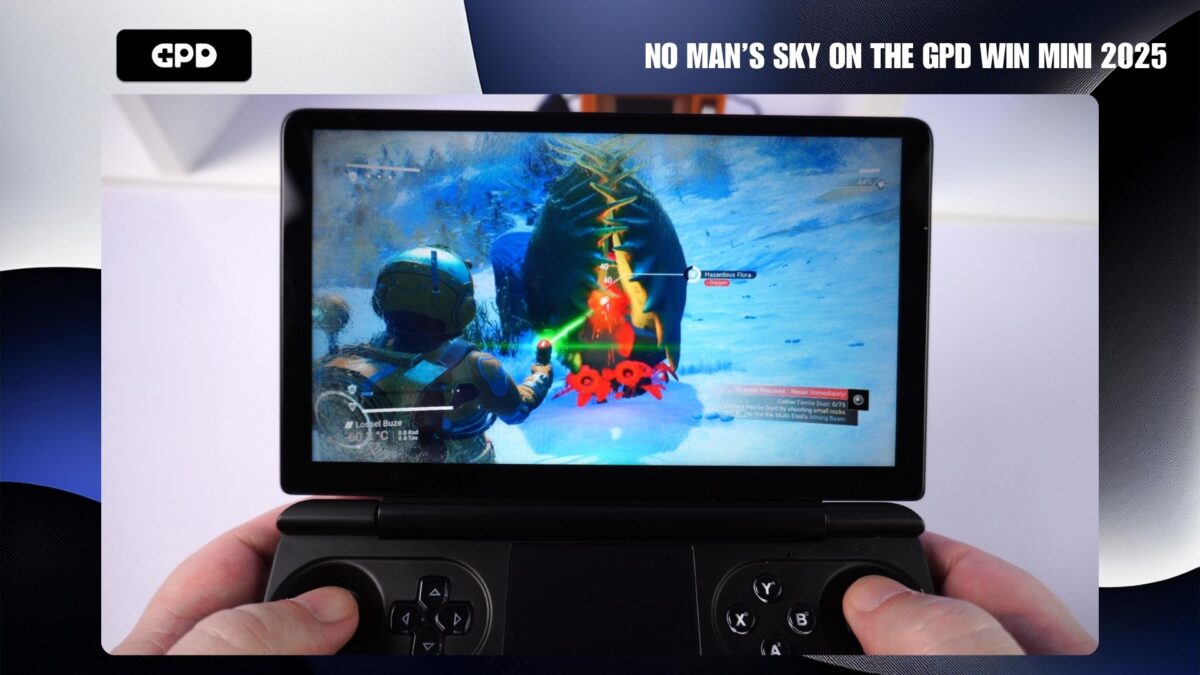
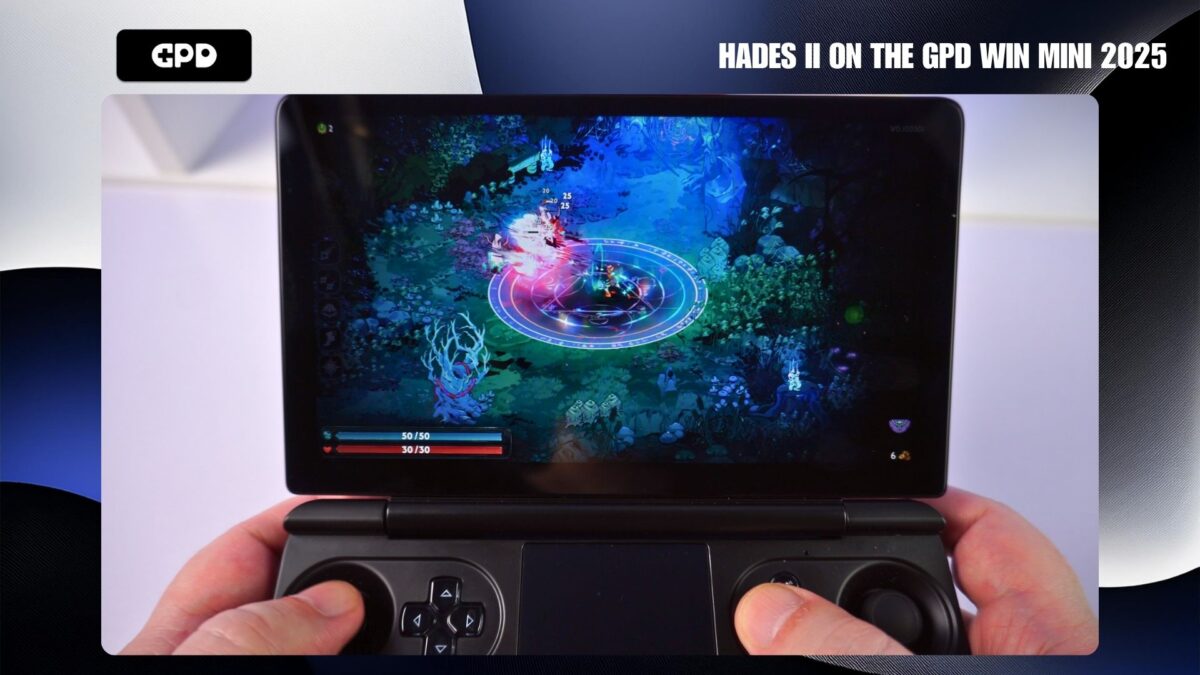
Lonely Mountain
In Lonely Mountain, you could go 720P Low settings to aim for 120FPS, or pick a higher resolution and detail level for a locked 60.
Overgrown
Overgrown runs smoothly at 1080P with AMD FSR set to Balanced for 60+ FPS. You can always tweak the FSR setting if you want finer visuals, but the default setup is already pretty good.
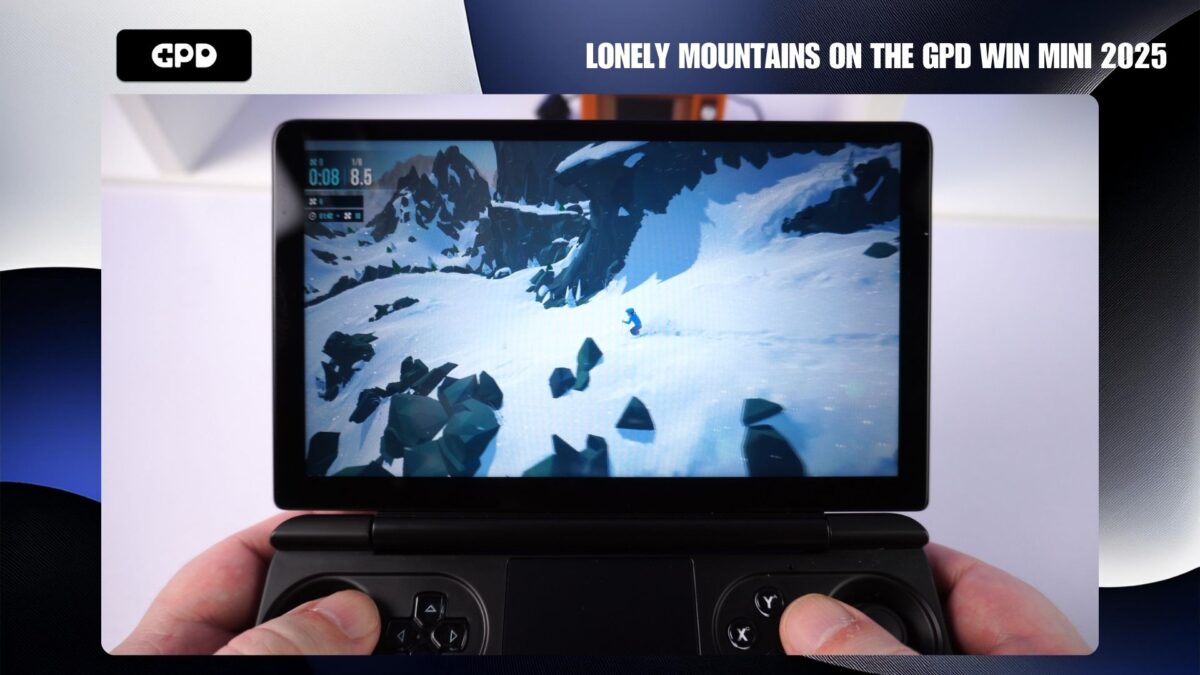
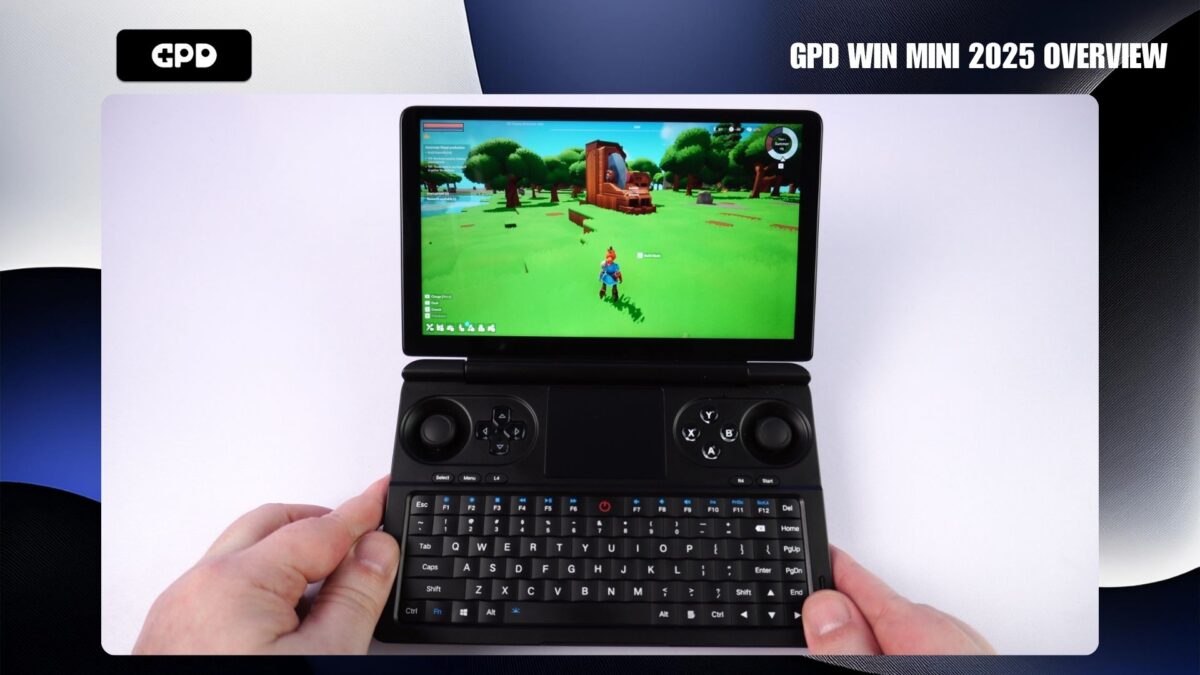
Emulator Performance
Next in our GPD WIN MINI 2025 review is a look at retro gaming and emulation. If you’ve seen the GPD WIN 4 2025 or GPD WIN MAX 2 2025 reviews, you already have guessed the GPD WIN Mini 2025 performs similarly.
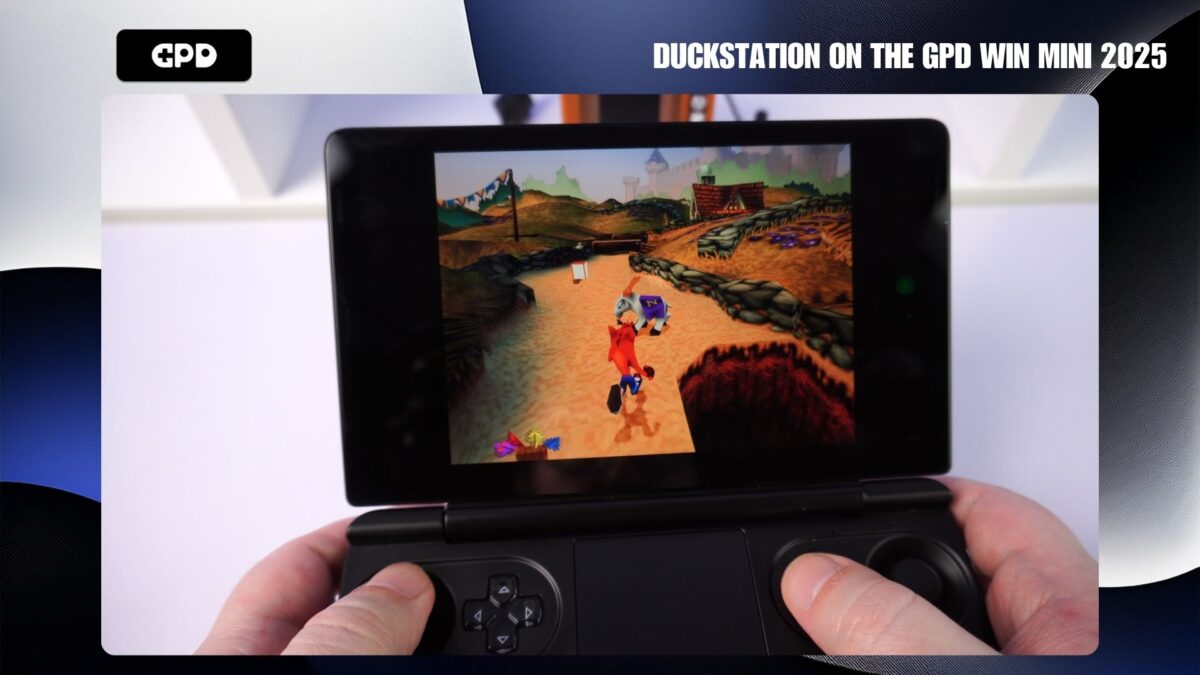
All your favorite classic consoles, home computers, and handhelds up to the PS3 era should run at full speed. You can boost internal rendering resolutions or add graphical enhancements without slowdowns.
The PS1 emulator DuckStation looks fantastic at 1080P with added effects, greatly improving graphics quality. Likewise, the PS2 emulator PCSX2 supports most games and can also benefit from visual improvements.
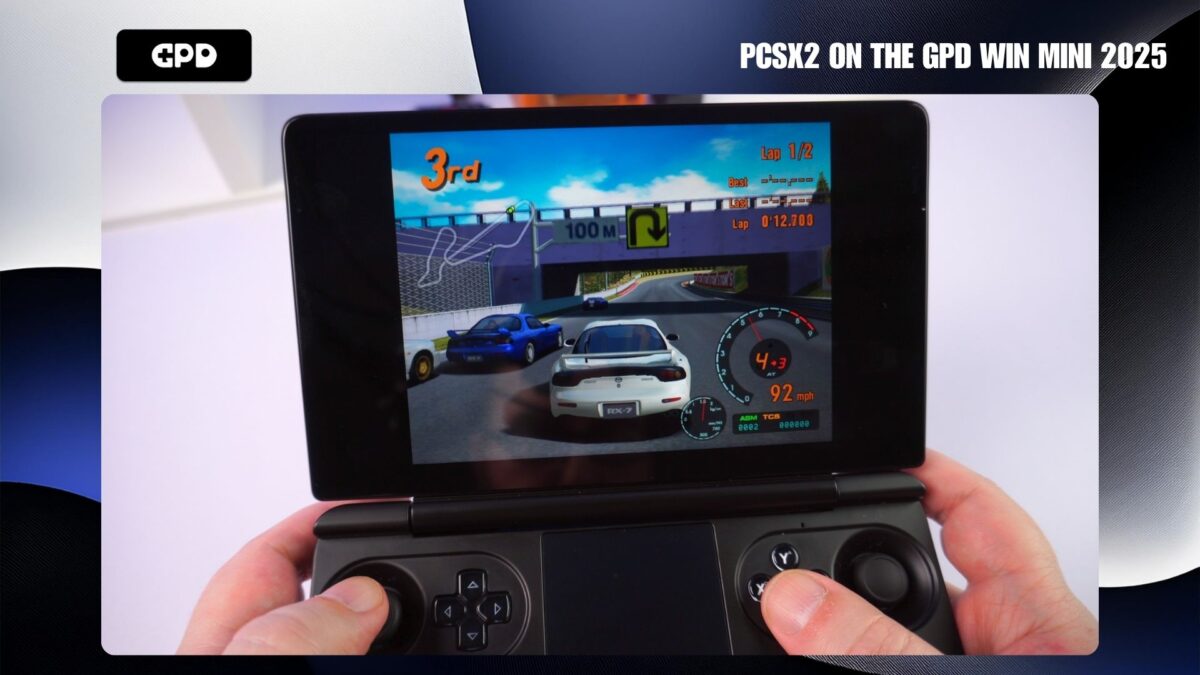
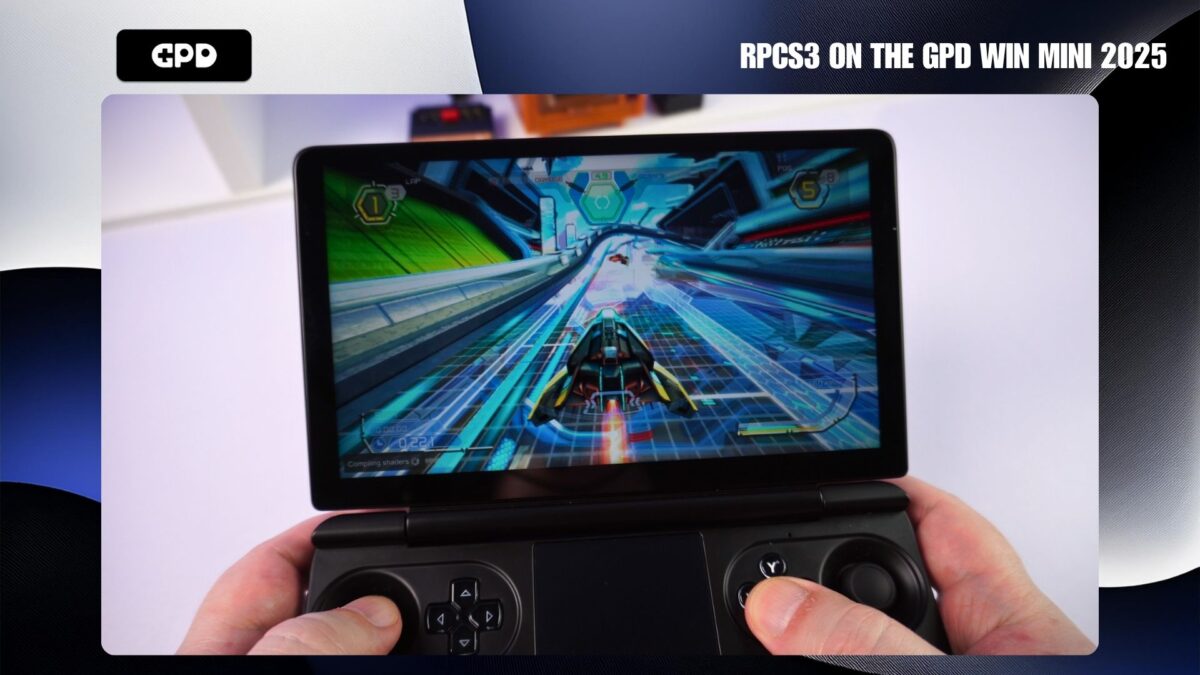
The PS3 emulator RPCS3 handles most compatible titles without issues. You may see shader caching notifications while gaming, but they typically don’t impact performance.
Vita emulation via Vita3K also works well for supported games, and for those less resource-heavy, you can double the resolution for an even sharper picture.
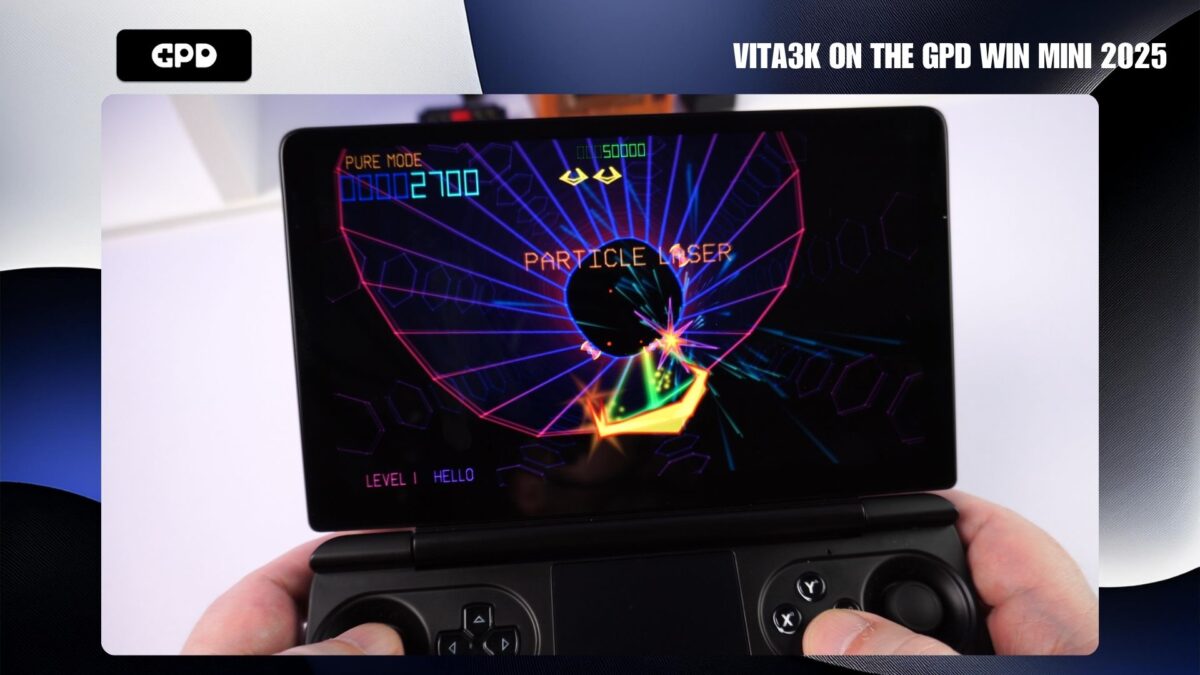
eGPU Support
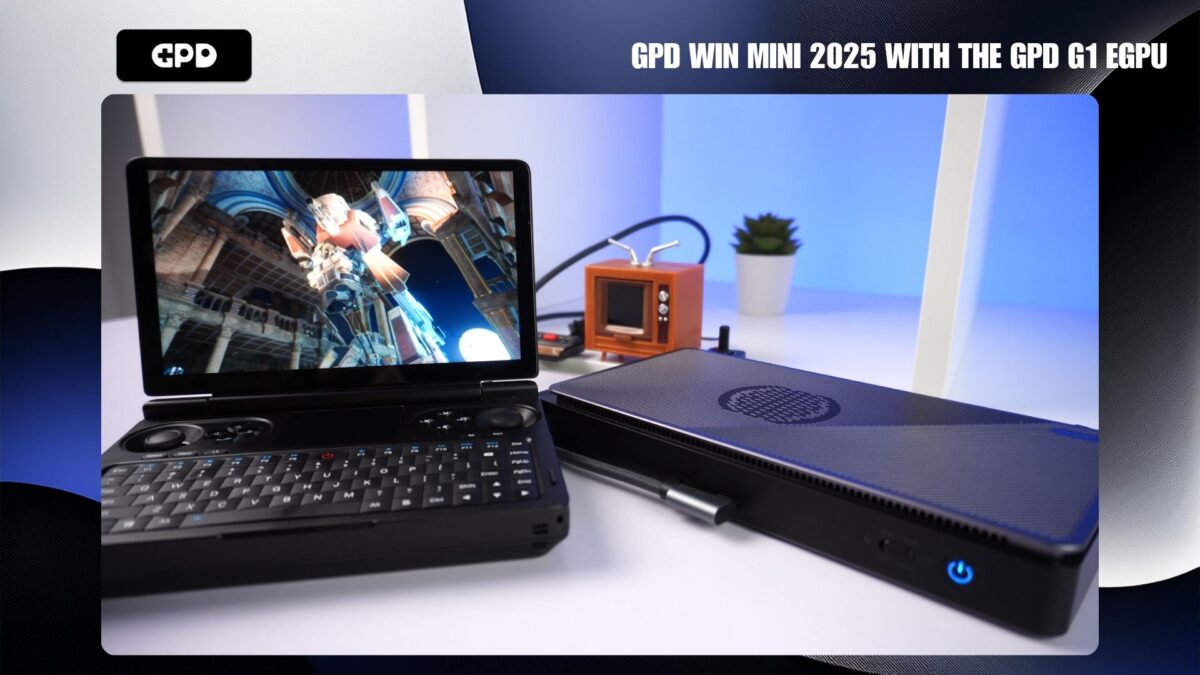
Although the GPD WIN Mini 2025 lacks an OCuLink port, you can still connect an eGPU—like the GPD G1 eGPU docking station if you want higher graphics performance. In our Cyberpunk benchmarking, we saw FPS climb above well above 90 frames per second.
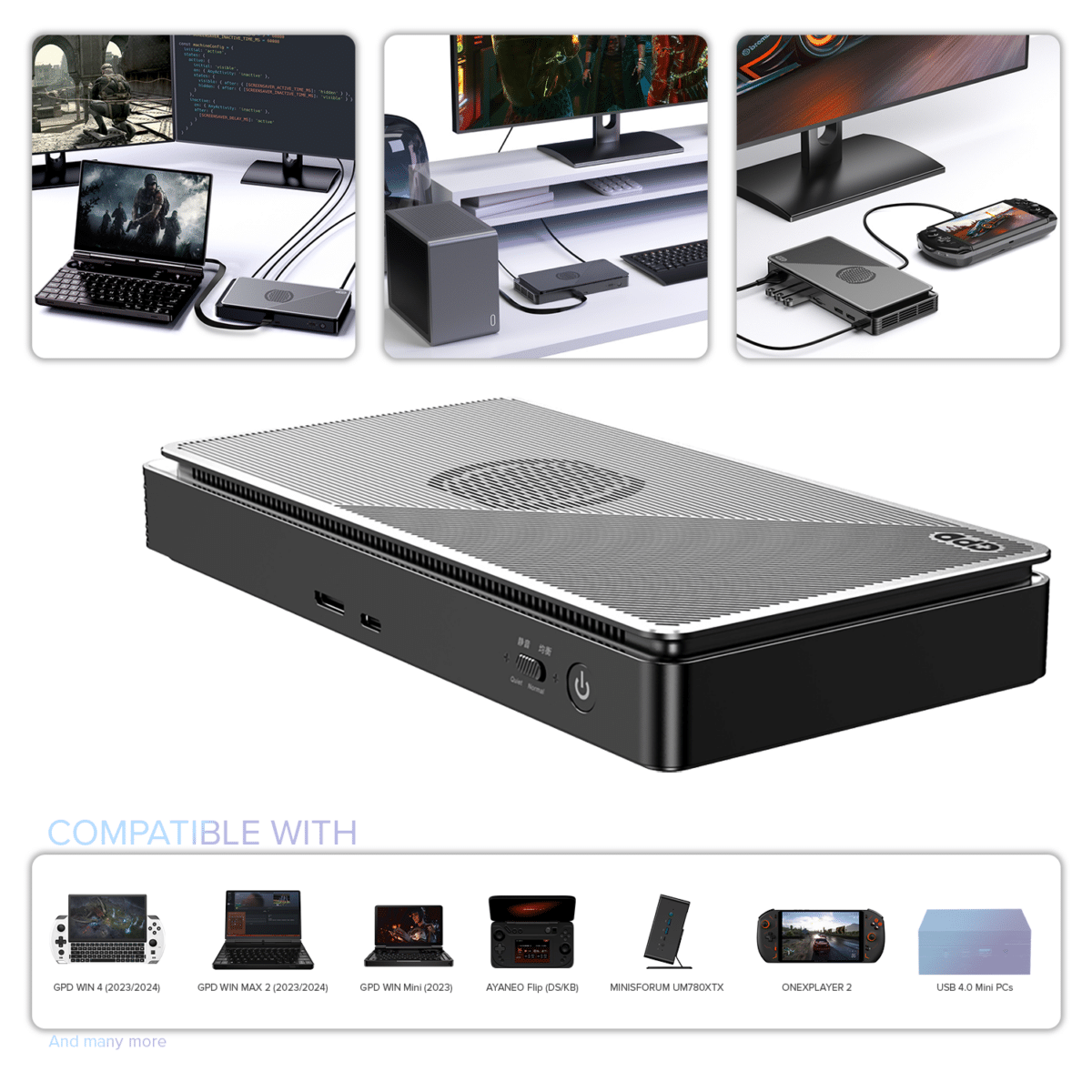
GPD G1 (2024) eGPU Docking Station
Final Thoughts
The GPD WIN Mini 2025 rounds out the trio of 2025 portable gaming computer refreshes we’ve assessed in GPD’s refresh. After testing each one in succession, it’s clearer than ever what benefits each model brings.
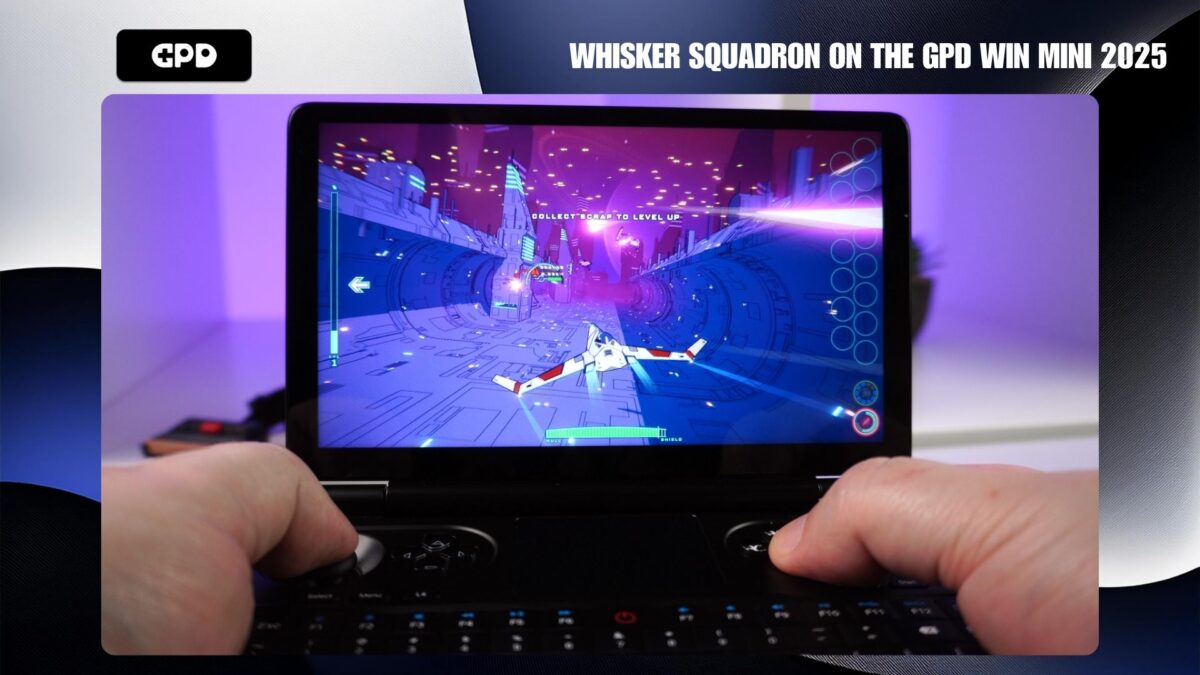
The GPD WIN Mini 2025 strikes a great balance of portability. By folding up into a clamshell design, you get a 7” 120Hz screen that looks excellent but still fits in, say, a coat pocket. Compared to the ONEXPLAYER ONEXFLY—also at 7 inches but with controls on the sides—the Mini feels much more portable, and it offers more screen real estate than the WIN 4’s 6-inch display.
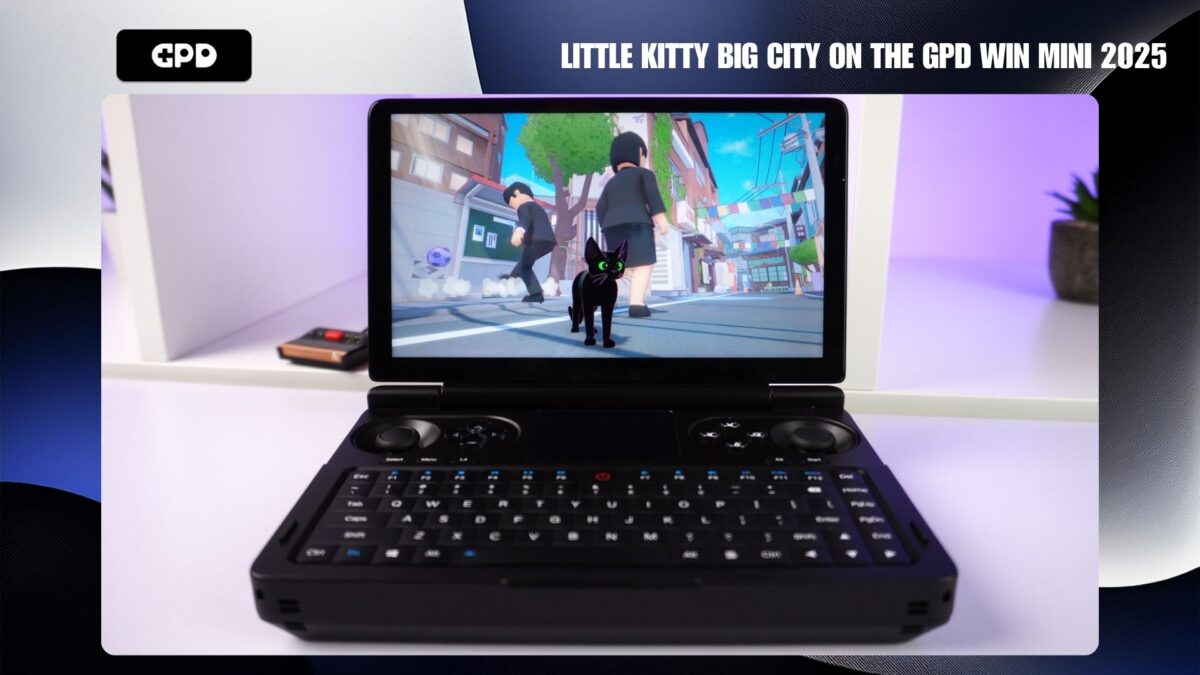
The keyboard is handy for short text inputs, light browsing, and so on, but you wouldn’t want to type an entire essay on the GPD WIN Mini 2025. The touchpad also adds flexibility, sparing you from having to rely solely on the touchscreen, which isn’t always convenient.
Performance-wise, it delivers top or near-top scores most of the time, though we do see a slight dip at lower TDPs, something to keep in mind if you’re looking to conserve battery life. You can tweak the CPU & GPU power balance to even this out.
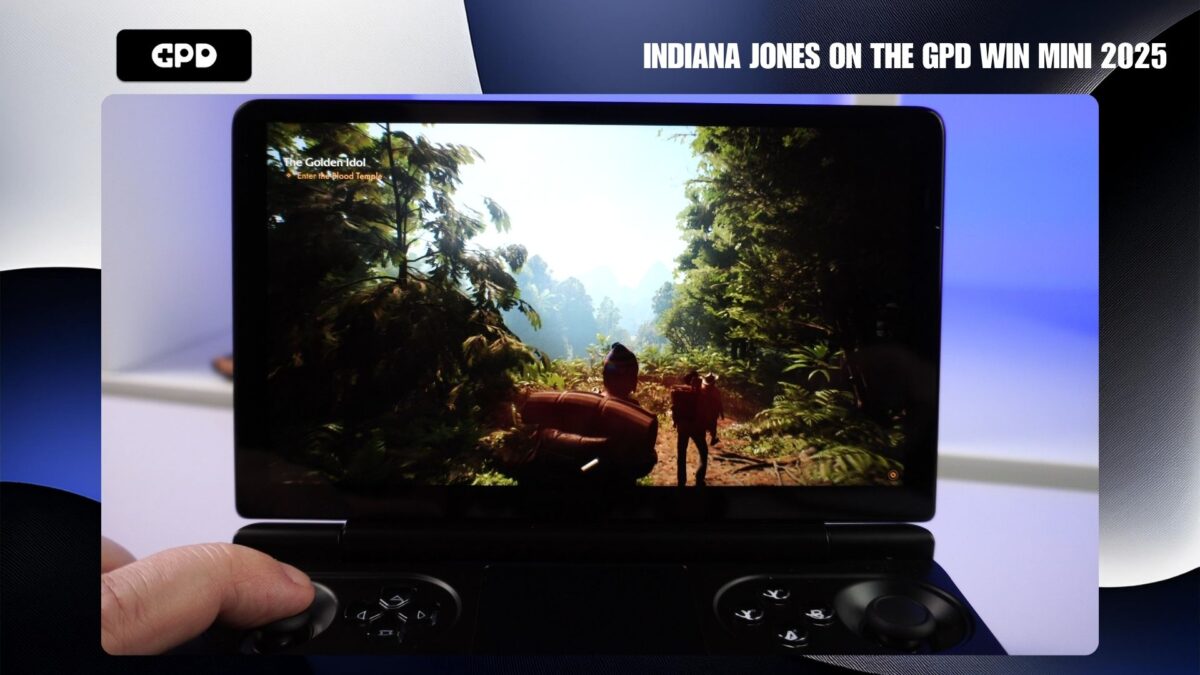
If this GPD WIN MINI 2025 review has piqued your interest, you can learn more and purchase your own GPD WIN Mini 2025 here. We even provide a two-year warranty on GPD devices, instead of the usual one year! With its unique mix of power and small form factor, the GPD WIN Mini 2025 stands as a top handheld gaming computer for anyone seeking a compact gaming PC on the go.
GPD WIN Mini 2025
- AMD Ryzen™ AI 9 HX 370 / Ryzen™ 7 8840U
- AMD Radeon 890M / 780M / 2900 / 2700 Mhz
- up to 64GB LPDDR5X @ 7500 MT/s
- up to 4TB High-Speed PCI-E 4.0 NVMe SSD
- WiFi 6E & Bluetooth 5.3 Support
Thanks for reading our GPD WIN MINI 2025 review, we hope you have found it useful. If you have any questions about it, please feel free to ask in the comment and we will be happy to respond. Thanks.
GPD WIN MINI 2025 Review
-
Design
-
Build Quality
-
Display
-
Performance
-
Features
Summary
The GPD WIN MINI 2025 packs a Ryzen AI 9 HX 370 processor and a 7” display with 60/120Hz refresh rates into a compact shell, delivering top-tier gaming performance on the go!
Pros
- Strong performance from the AMD Ryzen AI 9 HX 370 CPU & AMD Radeon 890M GPU
- Highly portable design, ideal for gaming on the go
- Vibrant 7” display offering both 60Hz and 120Hz refresh options
Cons
- Compact keyboard layout can feel cramped for extended typing

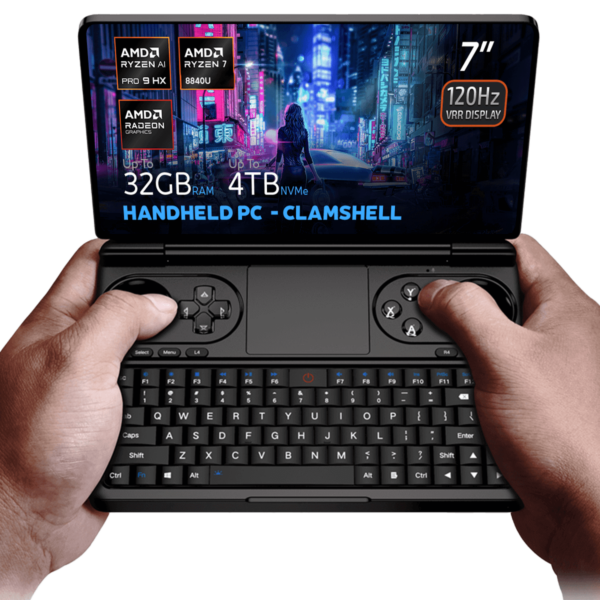
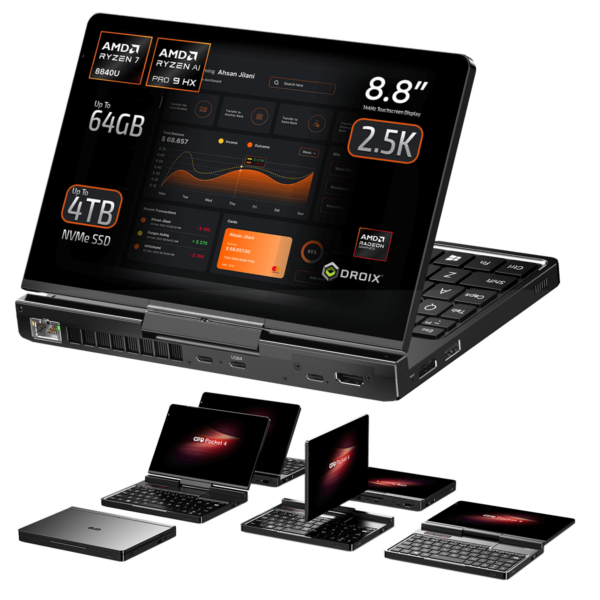
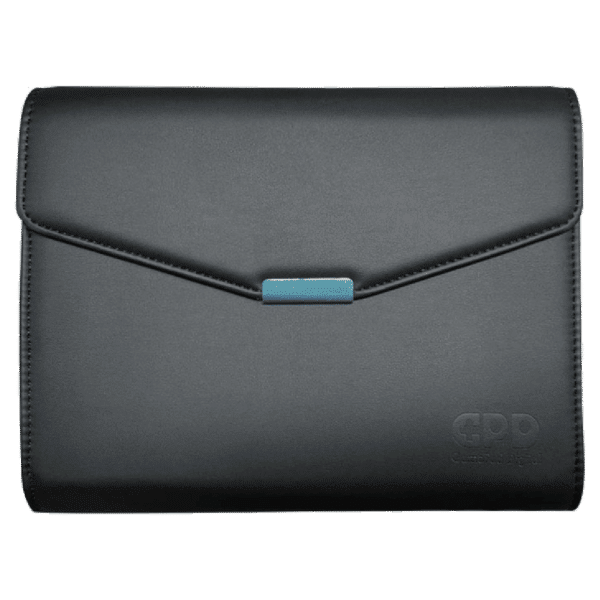
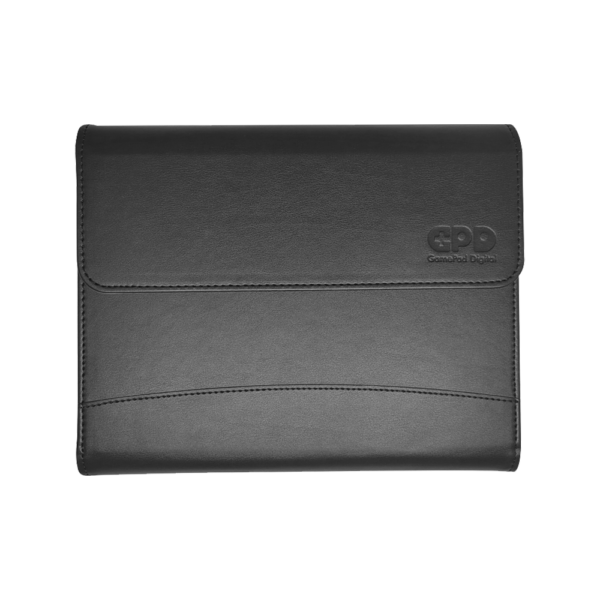
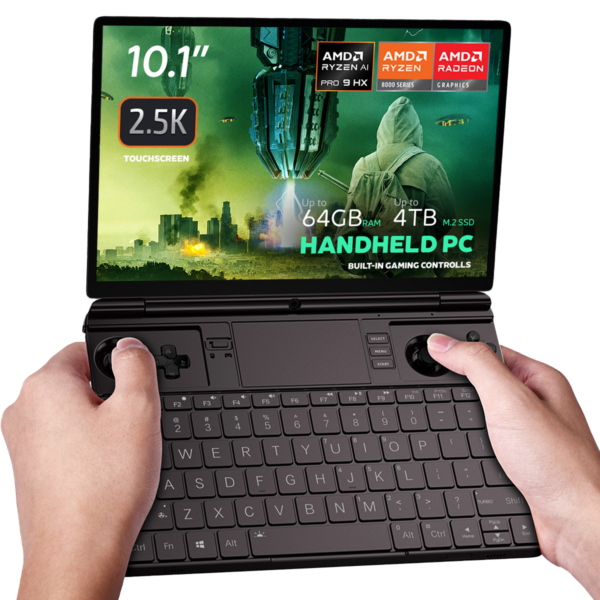
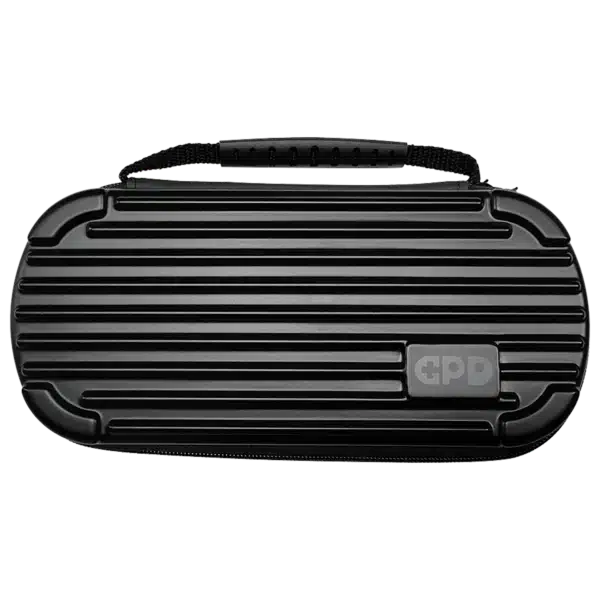
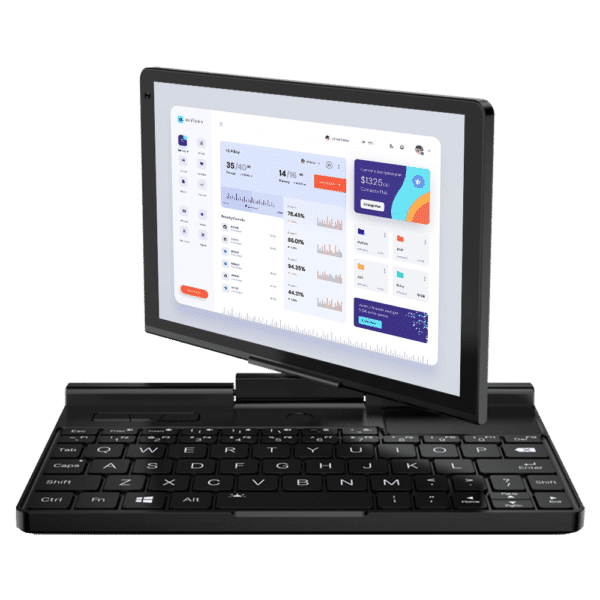
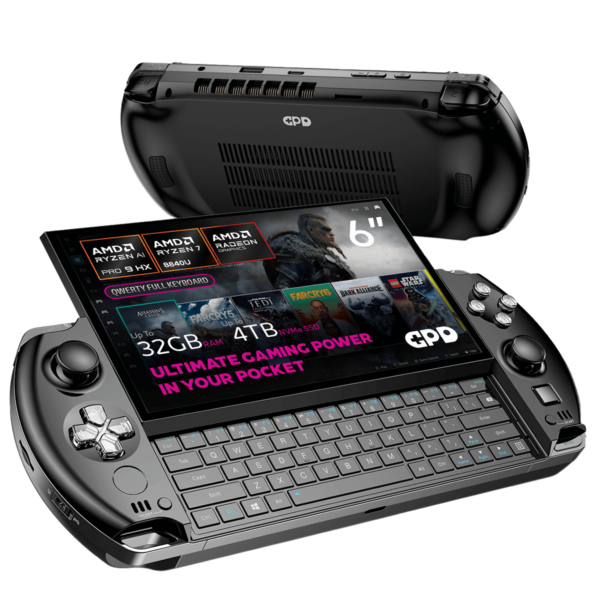
Hi, do this device support bypass charge? If not, how long or safe can device being play while being plugged in?
It supports a type of bypass charging. Once the battery reaches 100% it will switch over to using the charger. It is perfectly fine to leave the charger connected, I do it all the time.
I would love to win this!
There is no giveaway for this.